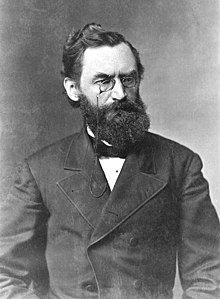Carl Schurz
| Carl Schurz | |
|---|---|
 |
|
| 13th United States Secretary of the Interior | |
|
In office March 12, 1877 – March 7, 1881 |
|
| President |
Rutherford B. Hayes James A. Garfield |
| Preceded by | Zachariah Chandler |
| Succeeded by | Samuel J. Kirkwood |
|
United States Senator from Missouri |
|
|
In office March 4, 1869 – March 4, 1875 |
|
| Preceded by | John B. Henderson |
| Succeeded by | Francis M. Cockrell |
| United States Ambassador to Spain | |
|
In office July 13, 1861 – December 18, 1861 |
|
| President | Abraham Lincoln |
| Preceded by | William Preston |
| Succeeded by | Gustav Körner |
| Personal details | |
| Born |
Carl Christian Schurz March 2, 1829 Liblar, Kingdom of Prussia |
| Died | May 14, 1906 (aged 77) New York City, New York |
| Political party | Republican |
| Spouse(s) | Margarethe Meyer |
| Alma mater | University of Bonn |
| Profession |
Politician Lawyer Journalist |
| Religion | Catholic |
| Signature |  |
| Military service | |
| Allegiance |
Forty-Eighters United States of America |
| Service/branch |
United States Army Union Army |
| Years of service | 1848 1862–1865 |
| Rank |
|
| Battles/wars |
Revolutions of 1848 American Civil War |
Carl Christian Schurz (German: [ˈkaʁl ˈʃʊʁts]; March 2, 1829 – May 14, 1906) was a German revolutionary, American statesman and reformer, U.S. Minister to Spain, Union Army General in the American Civil War, U.S. Senator, and Secretary of the Interior. He was also an accomplished journalist, newspaper editor and orator, who in 1869 became the first German-born American elected to the United States Senate.
Carl Christian Schurz was born on March 2, 1829 in Liblar (now part of Erftstadt), in Rhenish Prussia, the son of Marianne (née Jussen), a public speaker and journalist, and Christian Schurz, a schoolteacher. He studied at the Jesuit Gymnasium of Cologne, and learned piano under private instructors. Financial problems in his family obligated him to leave school a year early, without graduating. Later he graduated from the gymnasium by passing a special examination and then entered the University of Bonn.
At Bonn, he developed a friendship with one of his professors, Gottfried Kinkel. He joined the nationalistic Studentenverbindung Burschenschaft Franconia at Bonn, which at the time included among its members Friedrich von Spielhagen, Johannes Overbeck, Julius Schmidt, Carl Otto Weber, Ludwig Meyer and Adolf Strodtmann. In response to the early events of the revolutions of 1848, Schurz and Kinkel founded the Bonner Zeitung, a paper advocating democratic reforms. At first Kinkel was the editor and Schurz a regular contributor.
...
Wikipedia
